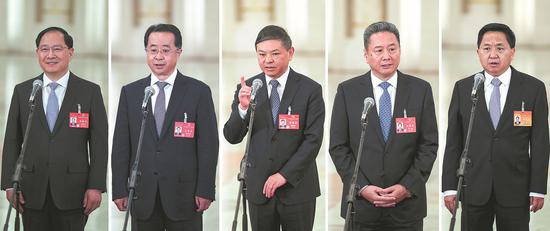
Five ministerial-level officials (from left) Jin Zhuanglong, Lu Zhiyuan, Huang Runqiu, Li Xiaopeng and Luo Wen answer questions after the plenary meeting of the National People's Congress at the Great Hall of the People in Beijing on Friday. (KUANG LINHUA/CHINA DAILY) Four ministers and a top regulator met the media after the plenary meeting of the National People's Congress at the Great Hall of the People in Beijing on Friday. AI to be leveraged for new industrialization China will step up the research and development of 6G wireless technology and launch an "artificial intelligence plus" initiative to leverage AI to promote new industrialization, the country's industry minister said on Friday. Jin Zhuanglong, minister of industry and information technology, said on the sidelines of the ongoing two sessions in Beijing that more efforts will be made to promote the deep integration of informatization and industrialization. "China will moderately advance the construction of the 5G network, computing power and other information infrastructure so as to better harness cutting-edge technologies to empower various industries," Jin said. He also called for more measures to build a modern industrial system with advanced manufacturing as the backbone. Transparency the aim in screening of aid recipients Minister of Civil Affairs Lu Zhiyuan pledged on Friday to make the screening of State benefit recipients more transparent and to fight corruption in the sector. "Social aid commands huge public attention, and is a matter of social justice," he said. "We must carry out related policies openly and transparently, and step up disclosure of beneficiaries." Lu said his ministry will launch a campaign to rectify nepotism and other wrongdoings in the field of social aid, and make sure welfare programs serve as the last defense to keep financially strapped groups afloat during hard times. Lu's remarks came amid a nationwide effort to pinpoint vulnerable groups and prevent them from sliding into poverty. As part of the effort, the ministry and 10 other departments have worked to roll out a tiered system to classify potential aid recipients, and have allowed those not qualified for subsistence allowances to apply for special aid in areas such as education, housing and healthcare. Environmental protection work beats challenges Despite unfavorable meteorological conditions last year, China managed to maintain good momentum for steady improvements in its environmental quality, said Huang Runqiu, minister of ecology and environment. "The past year was a very complex year for environmental protection work, and we encountered many difficulties and challenges," he said, citing air pollution control as an example. The rapid recovery of economic activities after the COVID-19 pandemic had significantly increased emissions of pollutants in some sectors, he said. This resulted in great pressure in maintaining the quality of the atmospheric environment. The ultra-low emissions transformation in the steel industry was accelerated. It was completed for 220 million metric tons of steel production capacity last year, over three times the level in the previous three years, Huang said. Country's transportation system blazing new paths China has made notable achievements to build a strong transportation system in the past decade, with the successful construction of the world's largest high-speed railway network, an extensive expressway system, and a comprehensive postal and express delivery network, Minister of Transport Li Xiaopeng said in Beijing on Friday. "China boasts world-class port clusters," he said. "The construction of key projects such as the Sichuan-Xizang Railway and the Shenzhen-Zhongshan Bridge has been accelerated. The rural road system has been greatly improved." He said all villages now have access to postal services. Li said China will continue to improve its transportation infrastructure, deepen reform of the comprehensive transportation system, and promote cost reduction, quality improvement and efficiency enhancement in transportation and logistics. China to crack down on monopolies China will take bigger actions to crack down on administrative monopolies so as to offer a fair market environment for companies, a top market regulator said on the sidelines of the ongoing two sessions on Friday. Luo Wen, head of the State Administration for Market Regulation, said the country will continue to increase rectification of some administrative monopolies, like local protectionism. "The SAMR has already drafted regulations to further optimize the review mechanism on fair competition and will promote municipalities to enact such regulations as soon as possible," he said. "We are currently revising related regulations on legal registration for corporate development. During this revision, we made it clear that enterprises relocating to other places can directly go through registration procedures in the new place," he said. |
Powered by Discuz! X3.4
© 2001-2013 Comsenz Inc.